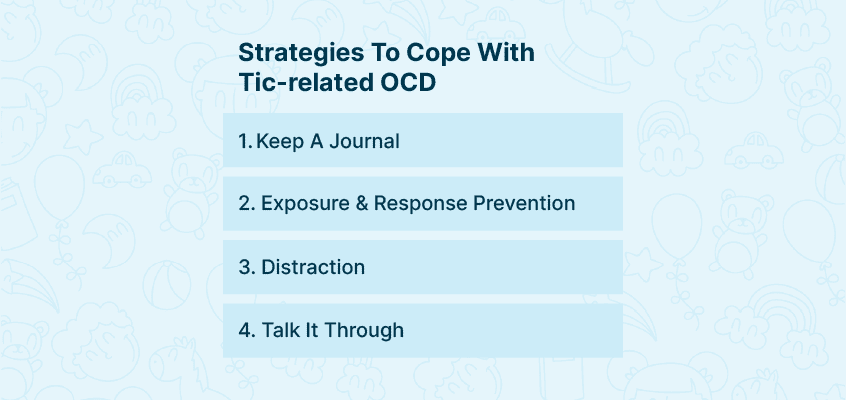Introduction
A pattern of unwanted thoughts and anxieties (obsessions) characterises Obsessive-compulsive disorder (OCD), which causes you to engage in repetitive actions (compulsions). These obsessions and compulsions disrupt daily life and create severe distress. Tic-related OCD is a novel diagnostic subgroup of OCD that arises in people with a tic disorder history.
You can try to ignore or stop your obsessions, but doing so will worsen your distress and worry. Finally, you feel compelled to engage in obsessive behaviour to alleviate tension. Despite efforts to avoid or eliminate unwanted thoughts or urges, they return, which results in other ritualistic behaviour – the OCD vicious cycle.
Our Wellness Programs
What is Tic-related Obsessive-Compulsive Disorder? (OCD)
The significant overlap between OCD and tic disorders, especially Tourette’s syndrome, has piqued the curiosity of researchers and is called “Tourettic OCD” or “Tic-related OCD”. Tics are involuntary, abrupt, repetitive, stereotyped motor motions or phonic outputs. Premonitory sensory cravings accompany them. Tics often occur in bouts, fluctuate in severity, and wax and wane. Eye blinking, neck jerking, shoulder shrugging, or throat clearing are simple gestures. Facial expressions, smelling objects, touching, or repeating words or phrases out of context are examples of ‘complex’ behaviours. When several motor tics and one or more phonic tics are present during the illness, we say it is Tourette’s Disorder.
An earlier age of onset that includes touching, tapping, and rubbing, a higher percentage of violent and aggressive intrusive thoughts and images, and concerns with symmetry and exactness distinguish Tic-related OCD. On the other hand, onset after adolescence, equal gender representation, contamination worries, and cleaning compulsions determine Non-tic-related OCD,
Looking for services related to this subject? Get in touch with these experts today!!
Experts

Kirti Bajpai

India
Psychologist
Experience: 5 years

Neelam Parwani

India
Life Coach
Experience: 5 years

Mansi Chawla

India
Psychologist
Experience: 12 years

Sapna Zarwal

India
Psychologist
Experience: 19 years

Deepti Gandhi

India
Life Coach
Experience: 6 years

Zabby Sharma

India
Life Coach
Experience: 11 years
What are the symptoms of Tics-Related Obsessive-Compulsive Disorder? (OCD)
It is difficult to distinguish between symptoms caused by OCD and those caused by Tic-related OCD in clinical practice. Simple motor or phonic tics, such as eye blinking or throat clearing, can usually be separated from compulsions by briefness, lack of goal, and involuntary nature. Complex motor tics, on the other hand, such as repeating things a certain number of times or until it “feel correct,” can be challenging to discern from compulsions.
No single symptoms are linked to Tic-related OCD; however, each patient has a distinct set of symptoms. Among these signs are:
- prominent touching, tapping, and repeating activities with the identified function of reducing bodily discomfort or ambiguous psychological suffering
- a preoccupation with unrelenting agony as a result of failure to conduct the repetitious acts
- the existence of undeveloped obsessional themes
What causes Tic-related Obsessive-Compulsive Disorder? (OCD)
Although it is unknown what causes Tic-related OCD, several recognised reasons include:
- Hereditary: Tic-related OCD is hereditary. Patients get it from their parents.
- Biological/neurological factors: Some study suggests a link between the development of Tic Related OCD and a serotonin chemical imbalance in the brain.
- Life changes: Major life changes, such as a new career or the birth of a child, might place a person in a position of increased responsibility, resulting in Tic-related OCD.
- People who are exceedingly organised, precise, and careful and those who like to be in charge from an early age are at risk of developing Tic-related OCD.
- Personal experience: A person with significant trauma is more likely to suffer from Tic-related OCD. For example, getting a severe rash from touching rat poison in the house can result in hand-washing compulsions.
How is Tics-Related Obsessive-Compulsive Disorder (OCD) diagnosed? [150]
Tic-Related OCD can be difficult to diagnose since symptoms might mimic obsessive-compulsive disorder, anxiety disorders, depression, schizophrenia, or other mental health illnesses. It is also possible to have OCD and other mental health problem. Collaborate with your doctor to ensure you receive the proper diagnosis and treatment.
There are some following steps to the diagnosis of obsessive-compulsive disorder:
- Psychological assessment: This includes talking about your thoughts, feelings, symptoms, and behaviour patterns to see if you have obsessive or compulsive habits interfering with your quality of life which may include chatting to your family or friends with your permission.
- OCD diagnostic criteria: Your doctor may use the American Psychiatric Association’s Diagnostic and Statistical Manual of Mental Disorders (DSM-5) criteria.
- Physical examination: Physical examination may help rule out other issues causing your symptoms and look for any complications.
What are Common misconceptions of Tics Related Obsessive-Compulsive Disorder (OCD) [150]
Popular culture and misinformation have confused the facts concerning OCD. People like claiming that they are “acting OCD” without a genuine understanding of what the condition is or what causes OCD.
People have a lot of negative and frightening perceptions about OCD, which can lead to them avoiding treatment and remaining in denial. Here are some of the most frequent myths and why they are false.
-
Myth: “People act a little OCD.”
Fact: Obsessive-Compulsive Disorder is a legitimate mental health issue. It is not a personality trait that you can choose to have or not have. And it is not a one-time occurrence. The disorder is associated with compulsions and obsessions.
-
Myth: “People with OCD just cannot relax.”
Fact: People with OCD experience acute anxiety, known as “obsessions,” making a living extremely difficult. This truth will not change no matter how often you tell them to “relax.” They utilise compulsive routines to escape worried. They can relax, but only when they have gone through their rituals or followed their way to a T.
-
Myth: “People suffering from OCD are automatically neat.”
Fact: While cleaning, washing, and tidying are everyday OCD activities, they are not the only manifestations of OCD. Checking, counting, and repeating chores are examples of compulsions. These aren’t always related to cleanliness.
-
Myth: “Everyone with tics also suffers from Tourette’s Syndrome.”
Fact: Tic disorders range from small and transient to more severe and permanent. Temporary tics can continue for several weeks or months and then go away, whereas more severe tics can be long-lasting, disabling, and affect multiple areas of the body.
-
Myth: “Only children suffer from tics.”
Fact: Tics can affect people of various ages and are not limited to children.
How do you cope withTics Related Obsessive-Compulsive Disorder (OCD)?
Many Tic-related OCD patients are at risk of being treated pharmacologically and with psychotherapy the same way as regular OCD patients are. These patients, however, are more challenging to treat and may be more prone to premature termination or being branded as ‘treatment-refractory.’ As a result, these patients require extra pharmacological and psychological attention.
Strategies To Cope With Tic-related OCD:
Keep A Journal: A notebook can help you keep track of your triggers, discover new ones, and analyse the overall state of your OCD. Carry your journal with you wherever you go, and write down what happens when you perform a compulsion.
When you’ve finished journaling for the day and gone over your entries, ask yourself the following questions.
- What caused these conditions to set off my OCD?
- What would have occurred if I hadn’t followed through on my resolutions?
- What proof do I have that my worst nightmare will come true?
Exposure & Response Prevention: ERP is a standard method of confronting and maybe alleviating Tic-related OCD. When employing ERP, users expose themselves to a scenario that leads to an obsession and then refrain from engaging in the urge. Make an OCD ladder by putting your concerns and subsequent triggers on a 10-rung ladder in descending order of intensity from 1 to 10.
Distraction: Engage in a task that needs your full attention, such as building something with your hands.
Talk It Through: Hold a daily meeting with a member of your family to discuss your day and anything else that comes to mind.
What is an Effective Treatment for Tic-related Obsessive-Compulsive Disorder? (OCD)
Pharmacology
Clinicians who work with Tic-related OCD patients should coordinate their treatment with psychiatry to argue for appropriate pharmacological adjustments to the patient’s drug regimen. Tic-related OCD patients are more likely than regular OCD patients to benefit from SSRI augmentation. It is with low-dose neuroleptics or alpha-2 agonists, neuroleptic monotherapy, or alpha-2 monotherapy.
Psychotherapy
Clinicians working with Tic-related OCD patients will most likely need to take a different strategy to exposure and response prevention and supplementary use strategy to get the best therapeutic results. Tic-Related OCD patients are more prone to abnormal reactions to typical exposure and response prevention (E/RP) protocols. Some people require extensive rote practice engaging in “just wrong” versus “just right” behaviour before experiencing any relief in tension.
Conclusion
Clinicians can get practical benefits from using a well-defined Tourettic OCD categorisation. Many individuals with this unusual set of symptoms might be distinguished and identified. Potentially beneficial therapeutic components lead clinicians that would otherwise be disregarded instead of traditional OCD or TD therapies.
Information gathered from research activities such as family genetic investigations may point to an appropriate diagnostic placement. Further research into family history, personal history, course, treatment response, and prognosis would be beneficial in verifying the Tic-related OCD construct.
At times the symptoms of tic-related OCD can be so subtle that you might not look into them until they occur for a long time. And upon discovery, it is easy to self-diagnose and treat. However, you must remember not to self-medicate or treat as highly trained professionals can help you. Consulting with an appropriate medical professional can smoothen the diagnosis, treatment, and recovery process. For further guidance, you can visit the United We Care website.



















